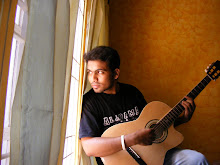Karnatic:
1. Ragam
2. Thalam
3. Shruthi
Western:
1.Scale(ragam(not exactly)/Shruthi)
2.Tempo(kinda thalam)
3.Chords(Kinda Shruthi)
Karnatic and Western:
1.Ragam/Scale is the notes of the song
2.Thalam/tempo is the beat on which any song is sung
3.Shruthi/chords is the background
Notes/Swaram:

Western Notes:
The above pic shows the notes for western music! They are "C,D,E,F,G,A,B,C......."and it continues and it is common for all the western instruments.Its also the same for indian classical instruments like veena but the only difference is that it is represented in a different way. The space between a note and the same note in the next position is called an 'Octave' . Eg., C-C or D-D.
The above keyboard starts with "F". There are totally four F's in the pics on the white keys. The fourth F is not shown.Its till E. Therefore, this is a 3 octave keyboard.
There are totally 12 keys in an octave. 12 keys(white and black). The black to the right of a white key is half note higher to the key and the black key left is half note lesser except for BC and EF. Notice ,there is no black key between. F is a note higher than E and C is a note higher than B.
The successive key on the right for a base key(A or B or ..) is represented as SHARP # of the key and the key on the left is represented as FLAT . I will be using 'b' for flat henceforth.
Eg., The black key very next to A will be A#. The black key before A is Ab. There are no sharps for B and E. Similarly, no flats for F and C.
Karnatic Swaram:
Similarly in Karnatic music, there are seven basic notes called swaras. they are "Sa,Ri,Ga,Ma,Pa,Da,Ni" . Again like octaves, they keep continuing even after 'Ni'. The same swaras will get repeated in the higher octave. the only difference is the pitch!
Like sharps and flats, they have different forms of the base swaras here. Except for 'Sa' and 'Pa',
all the other swaras are two. Totally again, there are 12 swaras but 7 basic. 12 swaras are as follows,
"Sa,R1,R2,G1,G2,M1,M2,P,D1,D2,N1,N2". the same set keeps continuing in the higher pitch like,
"Sa,R1,R2,G1,G2,M1,M2,P,D1,D2,N1,N2,Sa,R1,R2,G1,G2,M1,M2,P,D1,D2,N1,N2..". and it goes on and on..
Will write about Ragas ,Scales and Chords in the following post.

Good Analysis Sucha.
ReplyDeleteI have a question?
Is it possible to discover a new note in between 2 existing notes? And I wonder how will it sound!!!. If we can get them, then the scope for composing music becomes larger right?
First time it may sound awkward cos, we have never heard it before. Once those notes gets registered in our long term memory as a note of a music / sound, we will like it I guess.
You are correct Danny. There are infact 1000s of notes between two notes. Since all the notes cant be brought on any instrument physically,its not there. Still some instruments like violin which has no frets between the notes, could be used to play these notes between notes.Some keyboards have Pitch blend for the same reason!
ReplyDeleteActually in carnatic music, there are swaras like N3,D3,G3 etc..For example, here N3 will be between N2 and Sa. Karnatic vocalists use these swaras/notes while they sing some ragas/songs.Will tell in detail about it when I write about ragas!
Thank you :)
Nice to know that Sucha.
ReplyDeleteI'm your fan. Will keep watching this space.
Gnanasooniyam! :)
ReplyDeleteGood start.
Gnanasooniyam! :) ? :/
ReplyDeleteThanks Kp! Read and share anywys! :)
ReplyDeleteSucha,
ReplyDeleteone doubt da.. U have specified a name(Shruthi) all over the post da.. is it Kamal's daughter or some one else ;)
One thing da, for a guy like me who aint know head or tail in music, gr8 explanations provided da...
Gud one to start wid.. Keep them coming.. help me become a vidvan :D
H Sucha!! Great Blog mann!! Hope u r getting me! Infact, im on the verge of joining a class on eiher guitar or violin.. This will be of immense help when i scale down the line.. Keep going..
ReplyDeleteRamachandran K V
Ur SBOA classmate
Obv da! how can i forget u? :) anywys thx for readin it! i ll post more! please read! :)
ReplyDelete@ balaji - U ll be a vidvan in a couple o days as i keep postin!! thx for readin please follow? :)
ReplyDelete@ Sucha,
ReplyDeletevidvan vidvan apdinu solriye... apdi enna avan vithaan?
A good comparison of both the genres! :-) Cheers! :-)
ReplyDeletewill i be able to pick up karnatik if i know western?
ReplyDelete